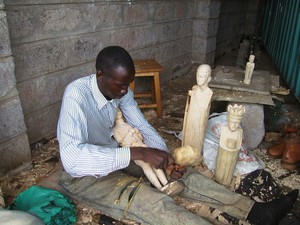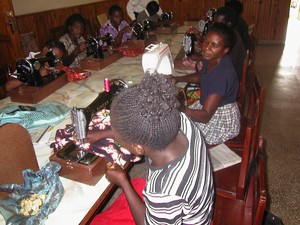Kenya: Self Help Groups Offer Youths a Lifeline
By Iyaya Kevin
 Major barriers to successful endeavors are fear of change, ignorance, uncertainty about the future and lack of imagination, but women and men in Kimilili District have found away to overcome this stereotyping through self-help initiatives or groups commonly referred to as ‘Chama’s” Swahili for self help group.
Major barriers to successful endeavors are fear of change, ignorance, uncertainty about the future and lack of imagination, but women and men in Kimilili District have found away to overcome this stereotyping through self-help initiatives or groups commonly referred to as ‘Chama’s” Swahili for self help group.
In the society that views white collar jobs, as the only means to gain financial independence and put food on the table today, women and men have come together to form Chama’s to empower, elevate their social status and cushion themselves against this tough times.
Bungoma Home Industries chairperson, Weyao Matimbayi, who is also a retired college lecturer started this group to pursue his passion while still teaching. At first he did it as a hobby, making traditional African music instrument, ornaments, furniture, and utensils, an art he took seriously after acquiring a scholarship to the UK, where he saw how people made a good living out of art.
When he came back from London, he set up a workshop employing five young people as his apprentice with the aim of empowering them with skills and finances. “I am living my dream, though I realized it a bit later in life, I am satisfied with where I am now.” He says “There are numerous opportunities for everyone.”
The group has expanded its range of products to include sofa set bead covers, guitars, bee-hives and sculptures, which they sell to retail supermarkets in Bungoma , Kakamega, Malaba and kitale such as Khetia’s and the newly opened Yakomart, who also doubles up as there distributors.
Juliet Netondo, secretary of Kimilili Ushindi Youth Group, shares the same sentiments, stating that some youths are just lazy and are looking for scapegoats for their misfortunes. She claims that before she joined the Chama, she was a house wife and life was extremely difficult, given that she was the families’ sole provider and had to pay school fees for her children.
But since then her life has changed drastically as her Chama, offers loans to members and none members as part of the Chama’s investment scheme alongside other businesses owned by the group.
Netondo’s group hails from Kimilili town and deals in production making energy saving jiko liners, food warmers and metal/ceramic jikos is in the process of expanding its line of products. “When we started out, we were not sure about what we wanted to do, but now we have no doubts that this is it and we are doing it right.” She says.
She however says that to organize and manage money and people is no easy fit, but the group has managed to get over this.
Another inspiration is the kamukuywa Juakiali KhakalundiFurniture, a group of middle aged men from Kamukuywa market a few kilometers from Kimilili town. This group deals in house hold and office furniture. It owns a great range of designs which they exhibit at every workshop and seminars they attend.
Remmy Wanyonyi, group’s chairman and a carpenter, claims that the group is made up of older men and nine youths as it is aiming at improving their thinking capacity and living standards through apprenticeship.
“We nurture talents and minds by deviating them, from the perception of a future with fewer or no job opportunities, because the youths themselves are the jobs. It’s just a matter of putting your priorities straight everything falls in place.” says a satisfied Wanyonyi. “Youths must stop complaining and do something about it.” He adds.
Kimilili district enjoys the highest number of self-help groups in Bungoma county, including Yetana Women’s group and Bismillah Hotel and Catering group, which comprises of young ladies only, thus bringing us back to the main issue at hand; the youths.

Youths in Kenya have blamed the government for lack of jobs, but Kimilili residents have a different opinion. “Idle youths are no more in our town and market places, as the area leaders have come up with initiatives to keep them busy and reproductive, such as farming, poultry and animal rearing.” says Mike Makhulo.
What worries Makhulo though, is the greedy nature of the middle men who pounce on youths who are out to better themselves by exploiting them and in the process discouraging them to relent.
He also cites inadequacy of funds to start out, lack of raw materials and market for their products, thus the need for government and other organizations involvement.
The Ministry of Industrialization and Cooperatives is working in hand with donors to empower women, men and the youths in particular by organizing seminars, workshops and exhibitions.
The government aim is to challenge the youth to do something about the issue of unemployment in the Kenya and Africa in general by encouraging them to invest in self-employment as it’s the only sure way to succeed during these times when the world has been hit by recession.
Makhulo commends the government for setting up Uwezo Youth Fund to help propel Kenyan women and youths to achieve better living standards through loans and business idea incubation centers. These types of business ideas will give one a test and experience on the importance of being in charge and at the top.
Youth Enterprise Development Fund (YEDF) was set up by government to increase economic opportunities for participation by the Kenyan youth in nation building through enterprise development and strategic planning.
“The government released 3.8billion shillings to help reduce unemployment by facilitating and supporting Small Micro-business enterprises to enhance oriented commerce infrastructure and marketing of products for the youth.” says Bruce Odhiambo, the chairman of the fund.
He says that the fund is planning to roll up new initiatives such as direct funding, sector specific financing, franchise financing, credit guarantee scheme and access market to enable the youths to engage in active economic development.
Through self-help groups, Kenyan youths can easily access grants and loans, thus have the opportunity to better and improve themselves despite the odds.
As Malcolm X once said, “Youths today, let’s set plans in motions to be our own bosses tomorrow, as the easiest and surest way to become a poor man is by working for somebody.”




